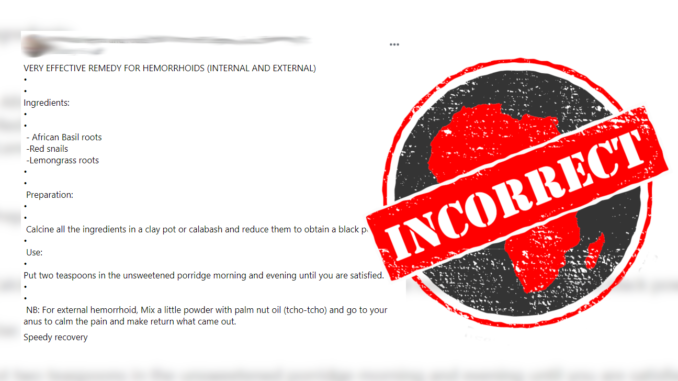
“Very effective remedy for hemorrhoids (internal and external),” reads a message on a Facebook page in Nigeria. It claims that a mixture of African basil roots, red snails and lemongrass roots will remove haemorrhoids.
It describes the preparation process and dosage, ending with: “For external hemorrhoid, mix a little powder with palm nut oil (tcho-tcho) and go to your anus to calm the pain and make return what came out. Speedy recovery.”
Will this mixture really cure haemorrhoids? We checked.
Treatable medically and surgically
Haemorrhoids, also known as piles, occur when the veins in the lower rectum and anus become swollen. Internal haemorrhoids develop inside the rectum, while external haemorrhoids develop under the skin around the anus.
We asked Casimir Omuemu, a professor of medicine at the University of Benin in southern Nigeria, if the mixture would work.
“It doesn’t work at all,” he said. “This is not a scientific, approved treatment option.”
He added that there were medical and surgical ways to treat haemorrhoids.
“Medically, some drugs are used to prevent bleeding, reduce inflammation and pain. But drugs cannot cure haemorrhoids. You can have an operation or an endoscopic method to treat haemorrhoids.”
He explained that endoscopically, bands could be applied, or electrical heat or infrared used to burn haemorrhoids.
Omuemu added that once there was a tendency to develop haemorrhoids, whatever method was used to treat them, there were chances of developing them again several years down the line if the habit that led to them – such as straining during bowel movements – was not dropped.
He said the simplest way to prevent haemorrhoids was to avoid constipation by eating plenty of vegetables and drinking lots of water. You should also avoid straining during defecation.
He added that people should not use herbal remedies because they could cause injuries, particularly if applied to the anus.
Adegboyega Fawole, a professor of obstetrics and gynaecology at the University of Ilorin in western Nigeria, said women were more likely to develop haemorrhoids after childbirth.
“The incidence is higher after childbirth due to the pressure of the pregnancy and the pressure of pushing during childbirth and these may weaken the supportive structure around the anus.”
END

Be the first to comment